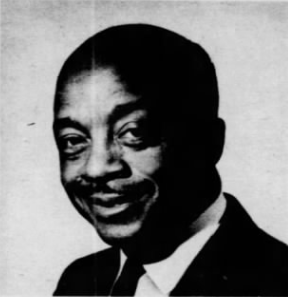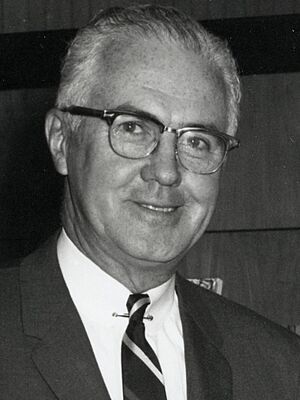Thomas McIntosh (politician) facts for kids
Quick facts for kids
Thomas McIntosh
|
|
|---|---|

Thomas McIntosh in 1967
|
|
| Member of the Philadelphia City Council from the 5th district |
|
| In office January 5, 1959 – January 3, 1972 |
|
| Preceded by | Raymond Pace Alexander |
| Succeeded by | Ethel D. Allen |
| Personal details | |
| Born |
Thomas McIntosh
May 11, 1921 Philadelphia, Pennsylvania, U.S. |
| Died | October 4, 2005 (aged 84) Philadelphia, Pennsylvania, U.S. |
| Resting place | Ivy Hill Cemetery, Philadelphia, Pennsylvania, U.S. |
| Political party | Democratic |
| Spouse |
Marjorie Osborne
(m. 1950) |
| Children | 6 |
| Occupation |
|
Thomas McIntosh (born May 11, 1921 – died October 4, 2005) was an important politician from Philadelphia, Pennsylvania. He was a member of the Democratic Party. McIntosh served on the Philadelphia City Council for three terms. He was first elected in 1959 and served until 1972.
Born and raised in North Philadelphia, he studied at Temple University and Lincoln University. He then served in the military during World War II. After the war, he became involved in local politics. He was chosen to replace Raymond Pace Alexander on the City Council. As a council member, McIntosh worked on important issues. He questioned police actions and became a powerful leader in the council. After leaving the council, he continued to work in government.
Contents
Early Life and Education
Thomas McIntosh was born on May 11, 1921. His parents were Robert and Creola Johnson McIntosh. He grew up in North Philadelphia. He went to Central High School and finished in 1940.
After high school, he attended Temple University and Lincoln University. In 1943, he joined the United States Army Air Forces during World War II. After the war, he earned his bachelor's degree in 1948. In 1950, he married Marjorie Osborne. They had six children together. McIntosh later studied law at Temple for two years. He then worked for the state's tax department.
Political Career
Starting in Politics
McIntosh was interested in politics since high school. He became a "committeeman" in his local area, the 29th ward. This meant he helped organize the Democratic Party in his neighborhood.
When Councilman Raymond Pace Alexander decided to retire, local leaders chose McIntosh to run for his spot. This was for the 5th district in the 1959 election. McIntosh won easily in this Democratic area. He received 77% of the votes, which was the highest for any council candidate that year.
Key Issues and Leadership
In his first term, McIntosh focused on police behavior. He questioned if police were using too much force, especially against minority groups. He also wondered if there was a "deep-seated animosity" from police towards Black residents.
At the same time, he disagreed with some civil rights leaders. For example, he did not support setting aside specific jobs for certain races in city hiring. He believed jobs should not be designated for any particular race.
In 1963, McIntosh became the leader of the 29th ward. He was re-elected to the City Council that year. He won with 75% of the vote. In his second term, he pushed the School District of Philadelphia to make sure all schools were equal. He also wanted school boundaries redrawn to help with racial integration. He led an investigation when a Black police captain died after being turned away from a hospital in 1966.
Later Years in Council
In 1967, McIntosh supported Mayor James H.J. Tate for re-election. This was different from what his party leaders wanted. Even without the party's full support, he was re-nominated and re-elected to the council. He defeated his Republican opponent with 59% of the vote.
In 1968, McIntosh became the chairman of the council's Appropriations Committee. This committee manages how the city's money is spent. By 1970, he was seen as one of the three most powerful people on the City Council. These three were sometimes called the "triumvirate."
In 1971, he ran for a fourth term. The election was very close because of the mayoral race involving Frank Rizzo. McIntosh lost his re-election bid to Republican Ethel D. Allen. He was the only Democrat on the council to lose that year.
After City Council
After his defeat, McIntosh continued to work in government. He served as the director of the Office of Consumer Affairs under Mayor Rizzo. He kept this role under the next mayor, William J. Green, III. In 1978, he became the head of the Philadelphia Housing Authority. This agency helps provide housing.
Later, he worked for the Philadelphia Parking Authority. He also worked as a government consultant even into his eighties. Thomas McIntosh passed away on October 4, 2005, at the age of 84. He was buried at Ivy Hill Cemetery in Philadelphia.
 | John T. Biggers |
 | Thomas Blackshear |
 | Mark Bradford |
 | Beverly Buchanan |


